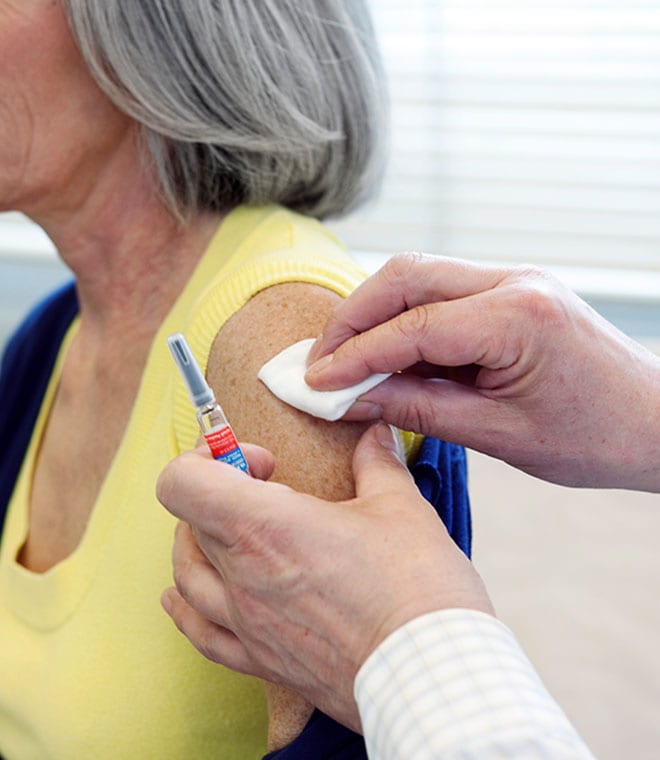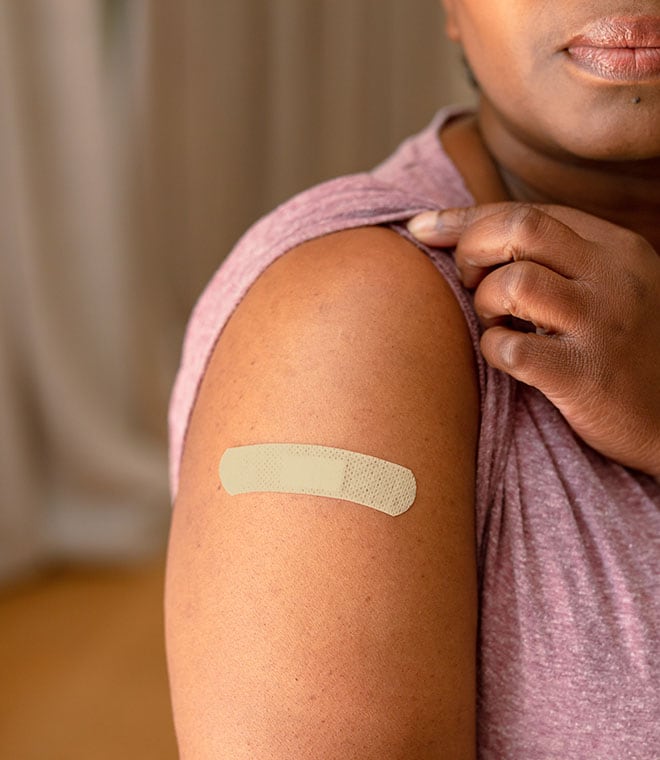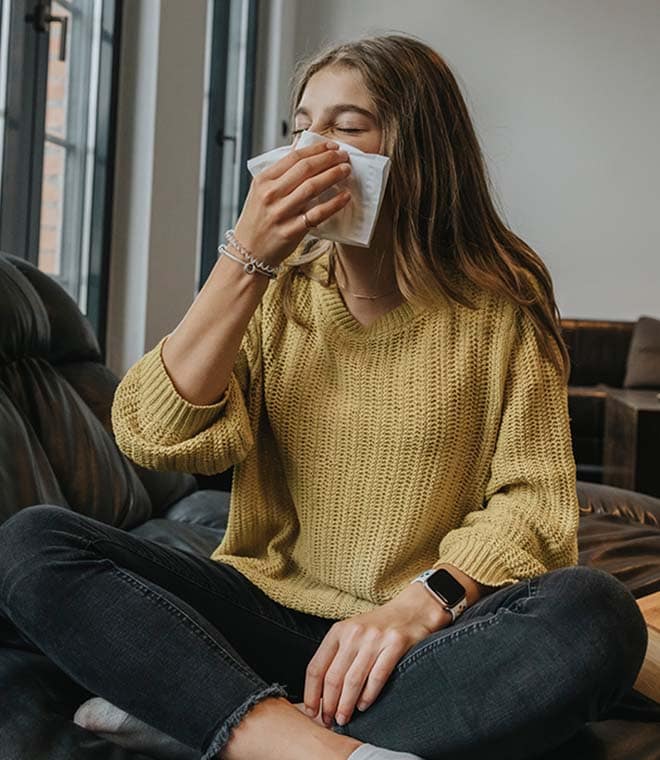Health
Is it RSV, COVID-19, the flu or a common cold? How to prevent and treat
By Christina Varvatsis, PharmD, BCPS Oct 21, 2025 • 6 min
It’s not just flu season anymore. “Respiratory illness season” also brings COVID-19, RSV and the common cold. But because many of these viruses have similar symptoms, it can be hard to know what you may have. Learn more about these common respiratory illnesses, testing options, and what you can do to prevent and treat these conditions.
Similar symptoms can make it hard to know what you have
Many respiratory viruses, like the flu, COVID-19, RSV and the common cold share similar symptoms, such as a fever, cough and a runny nose. It’s important to know what symptoms might help your healthcare provider narrow it down (think loss of taste or smell with COVID-19).
|
RSV |
COVID-19 |
Flu |
Common cold |
Common signs & symptoms |
|
|
|
|
But because these viruses often have overlapping symptoms, testing is the only way to know for sure what you have.
Testing is available for COVID-19 and flu
Walgreens offers rapid COVID-19 and flu testing in a single swab for individuals ages 3 years or older, with results available in about 30 minutes or less. You can talk to your pharmacist or find more information about testing options on our website. You can also purchase an at-home COVID-19 and Flu test kit through our online store.
Treatment options
Depending on the illness you have, specific treatments may be available to help reduce your symptoms (another reason to get tested!).
COVID-19
Antiviral medications, such as Paxlovid, may be considered for people at high risk of developing severe COVID-19. Antivirals must be started within five days of when symptoms begin, so be sure to seek treatment as soon as you start to feel unwell.
Walgreens pharmacists can prescribe Paxlovid for eligible individuals. Learn more about this service and find out if you qualify.
Flu
Antiviral medications for the flu, such as Tamiflu, Relenza, Rapivab and Xofluza can lessen symptoms and shorten how long you are sick. Antiviral medications for the flu work best if taken one to two days after symptoms begin.
General symptom relief
Not sure what you have? These tips can help manage your symptoms no matter the cause.
- Manage fever and pain with over-the-counter fever and pain relievers, such as acetaminophen or ibuprofen (remember — never give aspirin to children)
- Clear stuffy noses with saline nasal drops or suctioning (for infants or young children)
- Stay well hydrated by drinking plenty of fluids
- Make sure you’re getting enough rest
Vaccines help protect against flu, COVID-19 and RSV
Getting vaccinated is the best way to help stay protected against these common respiratory viruses. The updated COVID-19 vaccine is available at Walgreens for eligible individuals ages 3 years and older. Talk to your pharmacist to decide if it’s right for you. An annual flu vaccination is recommended by the CDC for everyone age 6 months or older, with rare exceptions. It is especially for those at high risk of serious flu complications, including young children, pregnant women, those 65 and older, and people with chronic health conditions. The CDC recommends RSV vaccines for:
- Protection in adults:
- All adults 75 and older
- Adults 50-74 at increased risk of severe RSV disease
- Protection in babies:
- Pregnant women (32-36 weeks gestation) to protect infants
- Infants (via nirsevimab if mother not vaccinated during pregnancy)
The good news? You can receive more than one vaccine in one visit to Walgreens. We vaccinate eligible individuals age 3 and older, so check out our vaccine scheduler to make your appointment.
Everyday preventive tips to help you stay healthy
RSV, COVID-19, flu and the common cold all spread when droplets from an infected person’s cough or sneeze enter your body through your nose or mouth (and sometimes eyes). Because these viruses are transmitted the same way, following a few simple prevention tips can help protect you against all four illnesses.
In addition to staying up to date on vaccines, be sure to:
- Wash your hands often with soap and water for at least 20 seconds
- Avoid touching your eyes, nose or mouth with unwashed hands
- Clean and disinfect commonly touched surfaces, such as phones, doorknobs and toys
- Avoid close contact with anyone experiencing symptoms or feeling unwell
- Consider wearing a mask in crowded indoor settings when respiratory illnesses are high in your community
Don’t forget to shop at Walgreens for all your symptom-relief products.
Clinically reviewed and updated- October 2025.
Sources:
- https://www.cdc.gov/covid/vaccines/stay-up-to-date.html
- https://www.cdc.gov/flu/season/2024-2025.html
- https://www.cdc.gov/rsv/vaccines/protect-infants.html
- https://www.cdc.gov/rsv/vaccines/adults.html
- https://archive.cdc.gov/www_cdc_gov/coronavirus/2019-ncov/hcp/non-us-settings/overview/index.html
- https://www.cdc.gov/rsv/infants-young-children/index.html
- https://www.cdc.gov/covid/prevention/
- https://www.cdc.gov/flu/prevention
- https://www.cdc.gov/covid/treatment
- https://www.cdc.gov/rsv/symptoms/index.html
- https://www.mayoclinic.org/diseases-conditions/respiratory-syncytial-virus/diagnosis-treatment/drc-20353104
- https://www.who.int/news-room/fact-sheets/detail/influenza-(seasonal)
- https://www.cdc.gov/covid/signs-symptoms
- https://www.cdc.gov/flu/signs-symptoms
- https://www.cdc.gov/flu/treatment/antiviral-drugs.html
- https://www.cdc.gov/acip/vaccine-recommendations/index.html
- https://www.cdc.gov/rsv/hcp/vaccine-clinical-guidance/pregnant-people.html
- https://www.cdc.gov/vaccine-safety/vaccines/rsv.html
- https://www.cdc.gov/mmwr/volumes/74/wr/mm7402a3.htm
- https://www.cdc.gov/acip/evidence-to-recommendations/covid-19-2024-2025-additional-dose.html
- https://www.cdc.gov/mmwr/volumes/73/rr/rr7305a1.htm
- https://www.cdc.gov/media/releases/2024/s-t0627-vaccine-recommendations.html
- https://www.cdc.gov/ncird/whats-new/cdc-updates-vaccine-recommendations-july-2024.html




